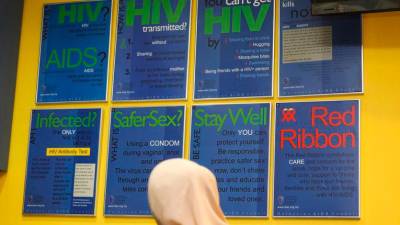KUALA LUMPUR: Stigma and misinformation about HIV continue to plague Malaysian campuses, with students fearing casual contact and shunning those living with the virus, a reality that student leaders warn is as harmful as the disease itself.
Universiti Kebangsaan Malaysia students Abang Abdul Hakim Abang Majidi, 22, and Muhammad Asri Ahmad Rafie, 23, are among those spearheading Kami, a peer-led initiative aimed at breaking myths and creating safe spaces in which fear no longer silences students.
Abang Abdul said misconceptions remain deeply entrenched, recalling a friend who panicked after a sexual encounter because he lacked basic knowledge about HIV transmission.
“One of my friends was terrified after having sex with a woman he barely knew. He came to me thinking his life was over but what he really needed was accurate information and reassurance.
“I guided him to use a self-test kit and, thankfully, his result was negative, but I advised him to re-test after the window period. That experience taught him the importance of being cautious and aware,” he said.
He also shared a personal memory from Sarawak, in which a close friend living with HIV was ostracised.
“One of the biggest myths is that people with HIV cannot share cups, plates or alcohol with others, or get married.
“These myths push them further into isolation and make them afraid to form friendships. HIV is not spread through casual contact, and with treatment, many live normal lives, including marriage,” he added.
Abang Abdul and Muhammad Asri admitted that the early stages of Kami were difficult as students were sceptical and hesitant, questioning why such a programme was needed on campus.
However, attitudes began to shift once they realised that the focus was on awareness and prevention, not encouragement of risky behaviour.
Abang Abdul said stigma often arises from the mistaken belief that HIV education promotes sexual activity, when the opposite is true.
“Kami was established to prevent HIV, not eradicate it. Through this programme, students see how important sexual health education is.
“Without protection, the risk of HIV increases. With Kami, they learn that if they do choose to be sexually active, protection is essential to reduce risks,” he said.
For Muhammad Asri, the challenge lies not only in correcting misinformation, but also in creating safe spaces for dialogue, something he feels is missing in many families and communities.
He said the fear of judgement often prevents young people from asking questions or seeking help, making Kami’s role critical.
“If you have made mistakes, do not hide or run. Share your experience because it might create awareness for others. You could become a hero from your mistake.
“We hope that Kami could expand to more campuses, especially in the Klang Valley, a hotspot for HIV.
“At least now students know who they can approach for questions, advice or support, and that makes campus a safer place,” he said.
